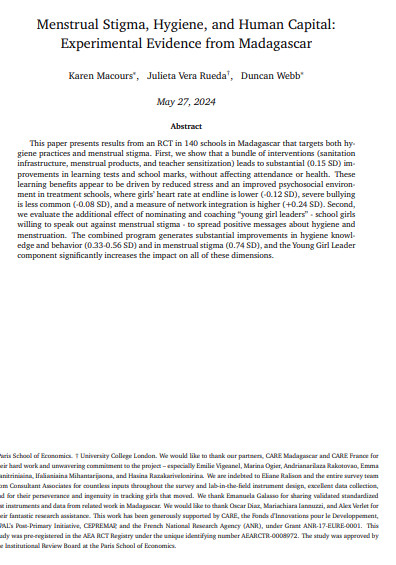Menstrual Stigma, Hygiene, and Human Capital: Experimental Evidence from Madagascar
 |
informe May 2024 ; 83 páginas
Aut. Karen Macours & Julieta Vera Rueda & Duncan Webb
Ed. PSE - Paris
Formato descargable: PdF
Descargable desde el editor
Abstract:
This paper presents results from an RCT in 140 schools in Madagascar that targets both hygiene practices and menstrual stigma. First, we show that a bundle of interventions (sanitation infrastructure, menstrual products, and teacher sensitization) leads to substantial (0.15 SD) improvements in learning tests and school marks, without affecting attendance or health. These learning benefits appear to be driven by reduced stress and an improved psychosocial environment in treatment schools, where girls’ heart rate at endline is lower (-0.12 SD), severe bullying is less common (-0.08 SD), and a measure of network integration is higher (+0.24 SD).
Second, we evaluate the additional effect of nominating and coaching “young girl leaders” - school girls willing to speak out against menstrual stigma - to spread positive messages about hygiene and menstruation.
The combined program generates substantial improvements in hygiene knowledge and behavior (0.33-0.56 SD) and in menstrual stigma (0.74 SD), and the Young Girl Leader component significantly increases the impact on all of these dimensions.
Palabras clave: |
País: |
Editor/Difusor: |
|
PSE
-
Paris School of Economics - Paris |
Si hay un enlace roto, estaremos encantados de recibir un mensaje: communication@pseau.org